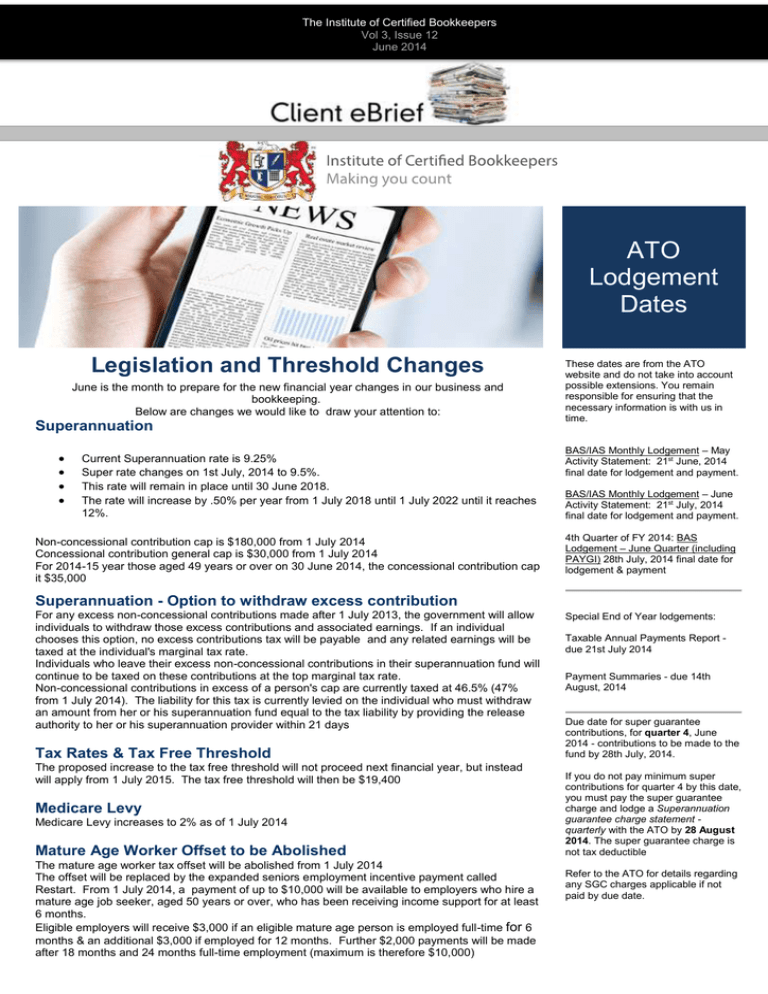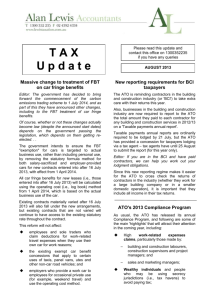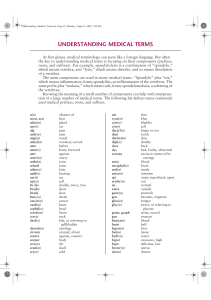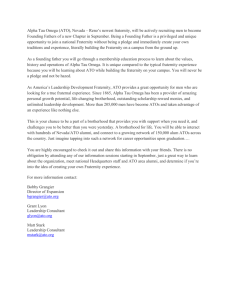June 2014 Bookkeeping eBRIEF
advertisement

The Institute of Certified Bookkeepers Vol 3, Issue 12 June 2014 ATO Lodgement Dates Legislation and Threshold Changes June is the month to prepare for the new financial year changes in our business and bookkeeping. Below are changes we would like to draw your attention to: Superannuation Current Superannuation rate is 9.25% Super rate changes on 1st July, 2014 to 9.5%. This rate will remain in place until 30 June 2018. The rate will increase by .50% per year from 1 July 2018 until 1 July 2022 until it reaches 12%. Non-concessional contribution cap is $180,000 from 1 July 2014 Concessional contribution general cap is $30,000 from 1 July 2014 For 2014-15 year those aged 49 years or over on 30 June 2014, the concessional contribution cap it $35,000 These dates are from the ATO website and do not take into account possible extensions. You remain responsible for ensuring that the necessary information is with us in time. BAS/IAS Monthly Lodgement – May Activity Statement: 21st June, 2014 final date for lodgement and payment. BAS/IAS Monthly Lodgement – June Activity Statement: 21st July, 2014 final date for lodgement and payment. 4th Quarter of FY 2014: BAS Lodgement – June Quarter (including PAYGI) 28th July, 2014 final date for lodgement & payment k Superannuation - Option to withdraw excess contribution For any excess non-concessional contributions made after 1 July 2013, the government will allow individuals to withdraw those excess contributions and associated earnings. If an individual chooses this option, no excess contributions tax will be payable and any related earnings will be taxed at the individual's marginal tax rate. Individuals who leave their excess non-concessional contributions in their superannuation fund will continue to be taxed on these contributions at the top marginal tax rate. Non-concessional contributions in excess of a person's cap are currently taxed at 46.5% (47% from 1 July 2014). The liability for this tax is currently levied on the individual who must withdraw an amount from her or his superannuation fund equal to the tax liability by providing the release authority to her or his superannuation provider within 21 days Tax Rates & Tax Free Threshold The proposed increase to the tax free threshold will not proceed next financial year, but instead will apply from 1 July 2015. The tax free threshold will then be $19,400 Medicare Levy Medicare Levy increases to 2% as of 1 July 2014 Mature Age Worker Offset to be Abolished The mature age worker tax offset will be abolished from 1 July 2014 The offset will be replaced by the expanded seniors employment incentive payment called Restart. From 1 July 2014, a payment of up to $10,000 will be available to employers who hire a mature age job seeker, aged 50 years or over, who has been receiving income support for at least 6 months. Eligible employers will receive $3,000 if an eligible mature age person is employed full-time for 6 months & an additional $3,000 if employed for 12 months. Further $2,000 payments will be made after 18 months and 24 months full-time employment (maximum is therefore $10,000) Special End of Year lodgements: Taxable Annual Payments Report due 21st July 2014 Payment Summaries - due 14th August, 2014 Due date for super guarantee contributions, for quarter 4, June 2014 - contributions to be made to the fund by 28th July, 2014. If you do not pay minimum super contributions for quarter 4 by this date, you must pay the super guarantee charge and lodge a Superannuation guarantee charge statement quarterly with the ATO by 28 August 2014. The super guarantee charge is not tax deductible Refer to the ATO for details regarding any SGC charges applicable if not paid by due date. Cash and hidden economy review and audits The ATO use a variety of risk indicators to identify businesses for review or audit because of the possibility they may be engaging in the cash and hidden economy. These indicators include results from data matching, comparisons of business information against our small business benchmarks and reports from the community. Based on these indicators, the ATO select businesses for review or audit. Find out more ATO Audit Processes – What You Can Expect Data matching Small business benchmarks About the cash economy Record keeping for small business What we expect of you ATO compliance approaches When contacting you, the ATO always take into account the individual circumstances of your business and provide an opportunity for you to explain your personal situation. Review and audit processes Reviews and audits usually involve looking at your affairs to ensure the information you have given the ATO is accurate and you have complied with your obligations. Reviews and audits are both considered 'tax audits' but there are differences between the two as they vary in their complexity. Depending on the complexity, the ATO sometimes need to contact other parties such as banks, employees, customers and suppliers to get information. Reviews Reviews allow the ATO to determine whether there are issues that require deeper investigation. The process also allows the ATO to check for any errors so that you can be helped to correct them. The type of review the ATO use depends on their initial assessment. There are two types, a phone review and an office review. Phone review A phone review is a short discussion (usually less than 30 minutes) the ATO initiates with you or your tax or BAS agent (or both of you) about what you have reported. This allows the ATO to resolve any discrepancies that they have identified. Discrepancies include what your business has reported to the ATO and information the ATO has collected from a third party, such as a bank or an online auction house. The phone review may result in no further action, or it may escalate to appropriate compliance action such as an audit. The result will be notified in writing and may take up to 40 days. Office review An office review is a longer (usually less than an hour) telephone discussion the ATO initiate with you or your tax or BAS agent (or both of you). Initiated through risk indicators, along with the business sitting outside the small business benchmarks. The ATO ask you to substantiate information you have reported on your tax returns or business activity statements. This could include you confirming your industry and providing the ATO with basic information on your record-keeping procedures, practices and controls. The 'office' review may result in further action, or it may escalate to appropriate compliance action such as an audit. The result will be notified in writing and may take up to 90 days. Audits The ATO conduct an audit if they think you may not be complying with your obligations or do not believe a review can look into the issues sufficiently. There are five types of audit: Record-keeping Audit Identified from various risk factors including strange benchmarks, low business income. The ATO evaluate your record-keeping systems. The ATO will ask you a series of questions and provide you with information on how to keep better records. Outcomes include take no further action make recommendations on how you should improve your record keeping practices impose a record-keeping penalty for failure to keep proper records escalate your case for a more intensive audit. Interview process may take 90 days make recommendations on how you should improve your record keeping practices take no further action impose a record-keeping penalty for failure to keep proper records escalate your case for a more intensive audit. Interview process may take 90 days j Specific audit-data comparisons audit Identified from a review or from a significant discrepancy between your reports and third party data matching. The ATO compare information received to what you have reported and can substantiate. Outcomes include take no further action amend your returns impose a record-keeping and/or false and misleading statement penalty consider prosecution. Interview process may take 120 days j Correspondence audit Identified from various risk factors including strange benchmarks, low business income or following a review. The ATO review your information against small business benchmarks. Outcomes include take no further action amend your returns based on information provided issue a default assessment based on the benchmarks for your industry impose a record keeping and/or false and misleading statement penalty. Phone process may take 120 days g Cash and hidden economy audit Identified from a review as a business with a high risk of not complying with tax obligations or from various other risk factors. The ATO review information reported and your substantiation of those reports. Outcomes include take no further action amend your returns amend director or partner returns impose a record-keeping and/or false and misleading statement penalty consider prosecution. Interview process may take 175 days g Complex audit Identified from a review as a business with complex tax affairs and at risk of not complying with your obligations. The ATO review information reported and your substantiation of those reports. Outcomes include take no further action amend your returns impose a record-keeping and/or false and misleading statement penalty consider prosecution. Interview process may take 250 days Further ATO explanation: Read the new cash and hidden economy review and audits guide so you know what to expect if involved in a review or audit. u http://ato.gov.au/Tax-professionals/News-and-updates/Latest-updates/New-Cash-and-hidden-economy- review-and-audits-guide/ Published: 14/01/2014 Disclaimer: All or any advice contained in this newsletter is of a general nature only and may not apply to your individual business circumstances. For specific advice relating to your specific situation, please contact your accountant or contact me for further discussion. The Institute of Certified Bookkeepers Tel: 1300 85 61 81 Email: admin@icb.org.au This newsletter is produced by The Institute of Certified Bookkeepers and distributed by members.


